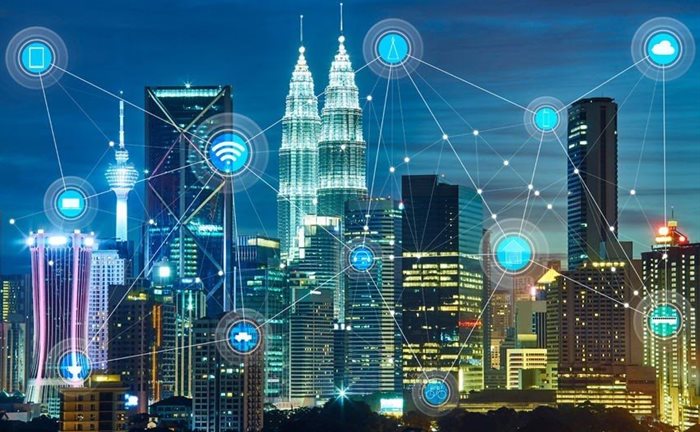
Source: Getty
Several projects followed this that focused on funding more data-driven and efficient cities over the next decade, leading to Yokohama in Japan being named a smart city demonstration project in 2010.
Smart cities are generally described as an urban area that offers citizens a socially inclusive zone that is environmentally sustainable and more efficient, using digital technologies and innovations to improve services to both business and the community. Therefore, smart cities are not only built on innovation and sustainability: they also have a strong focus on security, community, and improving their residents’ quality of life in an inclusive way.
According to Deloitte, smart city strategies are focused on six key areas: energy and environment, economy, education and government, mobility, living and health, and safety and security.
In essence, smart cities leverage new technology to create environmentally and economically sustainable living environments with the benefits, convenience, and even luxuries that new technology offers. It is important to keep in mind that, because technology, culture and lifestyles continually evolve, becoming a smart city is a continuous process, and so there will always be ways of doing things better.
Creating the environments that deliver the benefits to residents that a smart city strategy promises is a vital part of bringing the smart city concept to life. Building smart constructions is an integral part of smart cities, whether they are newly developed or existing cities being transformed with smart city strategic projects. Existing structures may be digitised, or new structures, such as smart homes, may be built to integrate technology fully.
Smart homes for smart living
With smart cities comes the smart home. The Internet of Things (IoT) is the backbone of the technology employed in smart cities and smart homes. IoT links the equipment and appliances of day-to-day living in the network of homes, businesses, and city infrastructure, transforming how these communities live and work.
Smart homes are connected to the internet, and the appliances in the home are automated so that they can be controlled remotely and, with artificial intelligence enabled, they can sense the needs of those living in the home and adjust the environment accordingly.
Simple examples are the home adjusting the lighting and music to create a relaxed atmosphere, or heating the water and filling the bathtub when the occupant is ready to take a relaxing bath. The possibilities are endless, and are continually evolving. However, this lifestyle comes at a cost that is not only financial.
These homes and systems are always connected, collecting data, analysing your behaviours, and predicting your needs. So be advised: when you share your routines and needs with a system that is designed to satisfy your needs, you are inviting business to satisfy those needs.
Living in a smart home in a smart city, where businesses such as your local grocery store know when your milk needs to be replaced, offers previously unimaginable convenience to the consumer – and great business potential. For this reason, we shall see businesses such as retailers getting involved in the ground-breaking phase of these planned smart cities.
Smart appliance retailers harnessing power of IoT
Naturally, we’ll see great interest from retailers that sell smart appliances in joining the development projects of these new smart cities, as they would be able to provide smart appliances to smart homes. When buying into a smart city development, future residents would expect the basic appliances already to have been built in and connected to the smart city network. Opportunities would extend to retailers that could provide support services and upgrades for these appliances as newer technology became available.
However, a key consideration would be that smart cities are built on sustainability and the concept of the ‘shared economy’; so the appliance retailer should reuse or upcycle old products to reduce the environmental waste that such upgrades create. Furthermore, because there will be more shared spaces in these cities, such as communal kitchens used by groups of residents, the retailer will need to adjust the product offering to be more durable and to offer a longer lifespan.
Dr Beate Stiehler-Mulder and Kgaugelo Mehlape 23 Nov 2021 Consumer goods retailers also want a piece of the smart pie
We might also see retailers of fast-moving consumer goods (FMCG) such as groceries joining the smart city project and connecting with the network of smart appliances to offer regular home deliveries – much the same as retail suppliers being connected to point-of-sale systems – so that automatic re-order levels are set. Thus smart city residents will be able to programme how often they would like to place another order, and perhaps even the price at which they would want to buy luxury items.
Retailers planning to expand into smart cities would also need to consider that some of them will have strict transport rules – for example, that residents may only use public transport, or that only green transport may operate in the city. Retailers would most likely have to move away from their current logistical practices for home deliveries and develop new strategies to get goods to homes in a smart city.
The move away from private vehicles and towards using smaller shared spaces in such a city would also significantly change consumer behaviour. For example, when buying groceries, month-end bulk promotions would no longer be an effective promotional strategy, and consumers would most likely respond to promotions such as ‘the meal of the day’ that comes ready to cook in compostable packaging.
Smart city ethics
Emerging smart cities offer vast opportunities to retailers, but they also require great responsibility. Retailers will be custodians of sensitive consumer data, knowing their routines and needs, which will make consumers more vulnerable. Enabling their customers to control the amount and type of data that retailers access and gather through the smart city network should be part of their strategy.
A key responsibility would be for retailers to abide by the Protection of Personal Information Act (the PoPIA Act) when dealing with customer data, as the new smart cities will generate vast amounts of consumer data every day.
The issue of ethical business and competitive practices should also be raised. How will the smart city ensure that small and local players have a fair opportunity to offer goods and services to it and its residents? Operating smart cities in a sustainable and corruption-free way may be one of the key challenges facing the stakeholders of these cities (*Jordão, Bianchini, Iano, Monteiro and França, 2021).
*Jordão, K.C.P., Bianchini, D., Iano, Y., Monteiro, A.C.B. and França, R.P. 2021. Smart city: A qualitative reflection of how the intelligence concept with effective ethics procedures applied to the urban territory can effectively contribute to mitigate the corruption process and illicit economy markets. In Proceedings of the 5th Brazilian Technology Symposium (pp. 557-570). Springer, Cham.











































